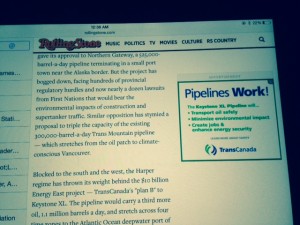Why Vetoing Keystone XL is not Futile
I recommend Tim Dickinson’s excellent Rolling Stone article about the Obama administration’s refusal, at least to this point, to greenlight the Keystone XL pipeline, and the Harper government’s years-long efforts to tie virtually the entire Canadian economy to oil production. Dickinson hits on every key point about the fateful and disastrous choices made by Stephen Harper. It begins like this:
“Since ultraconservative Prime Minister Stephen Harper—famously described by one Canadian columnist as ‘our version of George W. Bush, minus the warmth and intellect’—took power in 2006, he’s quietly set his country on a course that seems to be straight from the Koch brothers’ road map. Harper, 55, has gutted environmental regulation and fast-tracked colossal projects to bring new oil to market. Under his leadership, Canada has also slashed corporate taxes and is eliminating 30,000 public-sector jobs….Stephen Harper came of age in Alberta, a land of cowboys and oil rigs sometimes referred to as ‘Texas of the North.’ He began his career in the mailroom of Imperial Oil (today an offshoot of Exxon). He rose through Parliament promising a revolution in federal affairs under the battle cry ‘The West wants in!’ Following his election to prime minister in 2006, he wasted little time unveiling his plan to open up his nation’s vast oil reserves. Before an audience of British businessmen in 2006, he spoke of ‘the emerging energy superpower our government intends to build,’ and rhapsodized about the ‘ocean of oil-soaked sand [that] lies under the muskeg of northern Alberta.’ He framed the challenge of bringing that crude to market as though it were a Wonder of the World. ‘It requires vast amounts of capital . . . and an army of skilled workers,’ he said. ‘It is an enterprise of epic proportions, akin to the building of the pyramids or China’s Great Wall. Only bigger.'”
The grandiosity is staggering, reminiscent to me of the early years of George W. Bush’s disastrous presidency.
Many American observers, even some generally alarmed by climate change, have noted what they consider to be a pointlessness to President Obama declining to okay Keystone XL, considering that the amount of oil to be carried by KXL is only a fraction of the volume being carried in other pipelines already, and that too much oil is now being shipped by rail, a risk as great as pipeline spills. Yet, this misses a key point: Harper has staked his total transformation of the Canadian economy to this pipeline, in line with companies such as TransCanada, the backer of Keystone XL, or to the creation of two other pipelines that are vigorously opposed by many Canadians. One of these would go west from Alberta through British Columbia to the Pacific Ocean, while the other would go east toward the Maritimes and the Atlantic. If he is unable to build any of these three, his intention to mine the great bulk of the tar sands is less likely to be realized. To the extent that the Obama administration can impede those grandiose designs, even if that isn’t the point of American policy, it will be a good thing from my viewpoint, because I believe that harvesting the entirety of the tar sands will inevitably hasten planetary change that we dare not risk.
One side note that amused me while reading Dickinson’s article: a cheery ad from TransCanada popped up in my browser, endorsing the idea that “Pipelines Work!” Doubtless, it appeared because the name TransCanada was on that page of the Rolling Stone article. See the screenshot below. I highly recommend you read Dickinson’s entire article.



Leave a Reply
Want to join the discussion?Feel free to contribute!